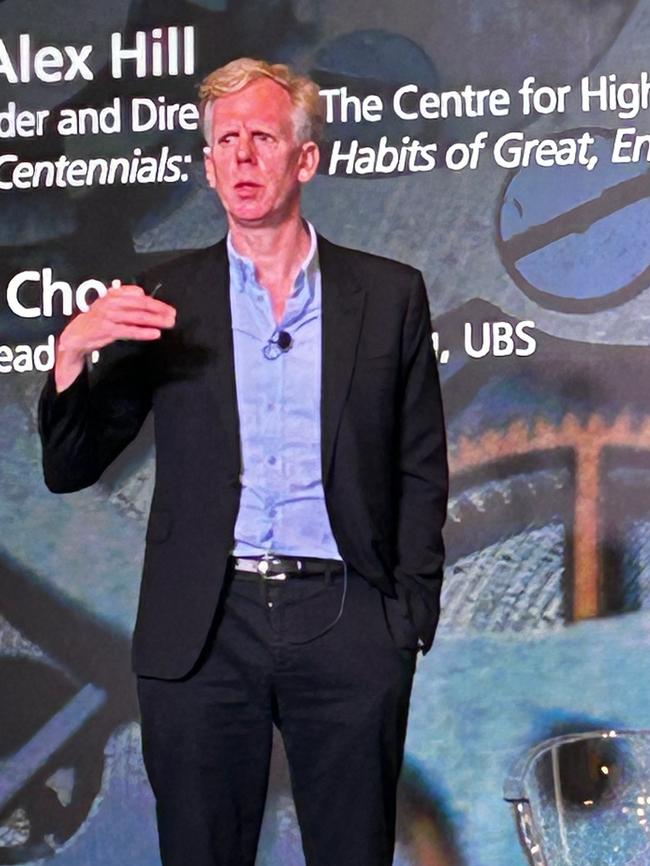Behind the science of longevity for successful companies
Longevity in organisations is rarer than you think. Here are some of the habits of healthy old companies.
Business
Don't miss out on the headlines from Business. Followed categories will be added to My News.
Australia has more than of handful of its own business centenarians.
Companies which have notched up more than 100 years include BHP, Rio Tinto; energy major AGL and each of the big banks including ANZ and Commonwealth Bank can trace their roots back more than a century. Westpac is more than 200 years old.
This longevity defies the hard fact companies typically live shorter than humans — much shorter.
Most start-ups fail within a few years, while even established firms in the UK and US count an average life of less than two decades. Google — a company that is everywhere — is barely in its 20s. Will Google parent Alphabet make it to 100 years?
Professor Alex Hill of the UK’s Kingston University’s Centre for High Performance has spent decades studying what makes an enduring organisation.

For big listed companies, the tension in organisations is around balancing tradition with innovation. Inside private and family organisations, the challenge is more acute. The new generations lose interest over time, particularly if the founder doesn’t give chosen successors the room to grow and manage the company.
Hill has done a deep dive into hundreds of enduring organisations which have outperformed their peers.
These range from listed and private, government-backed and sports, arts and education. He has worked with names from NASA, New Zealand’s All Blacks rugby team, the Royal Marines and Royal Shakespeare Company.
His groundbreaking study is designed to find out what makes them not only survive, but thrive over the long term. His research formed the basis of his book: Centennials. The 12 Habits of Great, Enduring Organisations.
Fundamentally, enduring companies need two key ingredients, Hill says.
The first is a “stable core” used as a platform to build into an organisation the idea of purpose, stewardship and openness. The second is for a long term organisation to nurture a “disruptive edge” which incorporates innovation, nervousness, and being prepared to bring in outside help.
Hill says it’s this tension between disruption and stability which helps organisations sustain success.
“If you’re too stable, then you’ll stop moving forwards and you’ll die. If you’re too disruptive, you’ll keep moving forward — potentially faster and faster — but it might be you’re heading in the wrong direction,” Hill said.
“The stable core is very much about direction and the disruptive edge is very much about movement”
Hill was speaking to The Australian in Hong Kong on the sidelines of the UBS Asian Investor Conference. (Please see disclosure below).
The former engineer is in hot demand among corporates and chief executives. He works with businesses and organisations from all over the world to help them consider their own longevity.
Some of Hill’s observations and objectives aren’t necessarily revolutionary — such as focus on good talent — but they certainly make persuasive arguments when it goes wrong. Hill’s work draws a line linking high-performing organisations over the long term.
Purpose
One of these common links are for enduring companies to have purpose beyond their immediate motivation.
For the New Zealand’s All Blacks, this is recognising their role as custodians of the game and through community outreach fostering links across all levels of the country. The 170-year-old clothing company Levi Strauss has a foundation which seeks to improve the rights and opportunities of immigrant workers. The endowment of the family of cereal maker Kellogg’s is behind the top-ranked Kellogg’s management school.
Purpose is critical to making sure an organisation is still relevant to the world. “If it isn’t, then actually what starts happening is the money and talent eventually dries up,” said Hill.
Meanwhile, socially-focused organisations, like theatre or even sport all try to form some connection with the very young. Hill uses the example of the Royal College of Arts in London holding a major painting competition for children as young as four, with winning portraits hung in top galleries.

Not only is there a focus on remaining relevant for a new generation, it’s about catching children when they are undergoing some of their most important development. This sets them up for a lifetime of recognition.
“What you find is these great organisations realising this — they actively say: ‘how do we stay relevant’?”
Sport has long figured this out in Australia, with the AFL’s Auskick program getting kids as young as five involved in the game. The NRL has its own non-contact version of rugby called League Stars that targets kids between four and 12.
“If you want to be successful for 100 years, you need to build an organisation where your grandchildren’s grandchildren would like to work with you, want to give you money or become supporters in some way,” Hill says.
One of Hill’s more surprising findings is a sense of vulnerability is needed in enduring organisations — even when they are successful.
“When you work with great organisations they’re constantly telling you, “we’re not as good as you once were, or I’m really worried about this. There’s a real nervousness”.
But, all this nervous energy is a good thing according to Hill, as it keeps organisations looking and searching for a new way forward.
Again, he points out the All Blacks will generally rotate their team after some of their biggest wins. “They’ve realised that actually, if you take a winning team and then try and win again, complacency starts to set in”.
Disrupters
Leaders can be disrupters as long as they are surrounded by enough stability and stewardship. But, the extreme to this is founders like Adam Neumann of office space operator WeWork which collapsed last year.
Hill likens good management to good parenting. A highly disruptive household is not the best environment for children to be raised in.
Hill says, over the long term, successful organisations and people who are in charge of companies aren’t the ones doing the disrupting. Here, it is vital for management bonus schemes to be structured to reward long-term returns.

Innovation is important, particularly in fast-moving industries. Think mobile phones, where customers swap to a new model every two to three years. People replace their laptops every few years, or cars are upgraded across several year cycles. Industry like mining plans in decades, and this means they have to consciously foster innovation to ensure they don’t stand still.
Hill says studies of big corporate failures regularly show they have their best year ever two years before they go under.
“They’ve always been managed in a way — normally by a salesperson, or by an accountant, who has seen their role as to maximise sales for existing products. And really they are often not interested in innovating. Creating the next product is more about how do we maximise the revenue from what we’ve got?”
“When the iPhone came out, BlackBerry sales actually went up. They had their best year ever after that. And then their sales just collapsed, All their products started dying at once”.
“I personally think if you’re investing in firms that have their best year ever, then you should be very, very nervous”.
*The author travelled to Hong Kong as a guest of UBS
More Coverage
Originally published as Behind the science of longevity for successful companies




